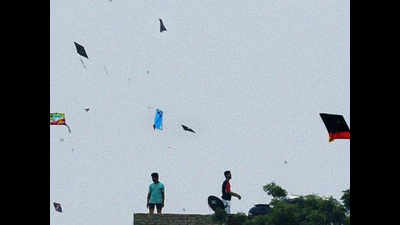- News
- City News
- delhi News
- Untying the knot: Police crack down on sale of Chinese manjha
Trending
This story is from August 10, 2020
Untying the knot: Police crack down on sale of Chinese manjha
Ahead of Independence Day, Delhi Police has seized several kilograms of banned Chinese manjha from an East Delhi market. A complaint was recently filed by People for the Ethical Treatment of Animals (PETA) India in this regard.

Delhi’s sky in full of kites ahead of Independence Day, several kilograms of banned manjha, popularly known as Chinese manjha has been seized from parts of east Delhi by Delhi Police.
NEW DELHI: Ahead of Independence Day, Delhi Police has seized several kilograms of banned Chinese manjha from an East Delhi market. A complaint was recently filed by People for the Ethical Treatment of Animals (PETA) India in this regard.
Police worked with PETA to identify locations where the “killer kite string” was being sold, despite a ban issued on it through a notification on January 10, 2017, from Delhi government.
PETA officials said spools of the illegal manjha, which is often coated with glass, metal or other sharp materials to increase its durability, were seized from the Gandhinagar market in Shahdara. Those found selling the banned manjha were booked under Section 5 of the Environment (Protection) Act, 1986. Other markets were also being scanned, said a police officer.
The ban on manjha aims to prevent harm to humans, birds and other animals as well as the environment. The government order permits flying kites only with cotton thread, which is free of any materials designed to increase its sharpness or strength.
“We commend the Delhi Police for conducting the raids and booking the offenders under the stringent law, which provides punishment of up to five years of imprisonment, or a fine of up to Rs 1 lakh, or both,” Barman added.
Thousands of birds get injured each year due to the banned thread, with over 70% of cases last year across Delhi’s bird hospitals involving manjha injuries. Most of the injured birds are unable to fly again, while it results in the death of several others.
The sharp thread has also proved to be dangerous for humans in the past. In February 2019, a motorcyclist died in Timarpur after his neck was slashed by a sharp manjha. In July of the same year, a three-year-old girl died after a stray piece of manjha cut her uncle’s neck, causing the motorcycle they were riding to crash. In August 2019, a 28-year-old engineer also died in Delhi after the sharp string slit his throat.
“It was very important to set a strong precedent to deter offenders from continuing to sell the banned manjha. Last year, at least six people and more than 700 birds died due to the manjha,” said additional deputy commissioner of police, Shahdara, Rohit Rajbir Singh.
“The manjha menace has to be met with zero tolerance,” he added.
In 2019, the banned manjha was seized from different markets, such as Sadar Bazaar, Chand Mohalla, Bara Hindu Rao Market, Madhu Vihar Market and Lal Kuan Bazaar.
Police worked with PETA to identify locations where the “killer kite string” was being sold, despite a ban issued on it through a notification on January 10, 2017, from Delhi government.
PETA officials said spools of the illegal manjha, which is often coated with glass, metal or other sharp materials to increase its durability, were seized from the Gandhinagar market in Shahdara. Those found selling the banned manjha were booked under Section 5 of the Environment (Protection) Act, 1986. Other markets were also being scanned, said a police officer.
The ban on manjha aims to prevent harm to humans, birds and other animals as well as the environment. The government order permits flying kites only with cotton thread, which is free of any materials designed to increase its sharpness or strength.
“Most people will choose plain cotton kite strings if they come to know that doing so can spare fellow humans, birds, and other animals of serious injuries and deaths,” said PETA India advocacy associate Pradeep Ranjan Doley Barman.
“We commend the Delhi Police for conducting the raids and booking the offenders under the stringent law, which provides punishment of up to five years of imprisonment, or a fine of up to Rs 1 lakh, or both,” Barman added.
Thousands of birds get injured each year due to the banned thread, with over 70% of cases last year across Delhi’s bird hospitals involving manjha injuries. Most of the injured birds are unable to fly again, while it results in the death of several others.
The sharp thread has also proved to be dangerous for humans in the past. In February 2019, a motorcyclist died in Timarpur after his neck was slashed by a sharp manjha. In July of the same year, a three-year-old girl died after a stray piece of manjha cut her uncle’s neck, causing the motorcycle they were riding to crash. In August 2019, a 28-year-old engineer also died in Delhi after the sharp string slit his throat.
“It was very important to set a strong precedent to deter offenders from continuing to sell the banned manjha. Last year, at least six people and more than 700 birds died due to the manjha,” said additional deputy commissioner of police, Shahdara, Rohit Rajbir Singh.
“The manjha menace has to be met with zero tolerance,” he added.
In 2019, the banned manjha was seized from different markets, such as Sadar Bazaar, Chand Mohalla, Bara Hindu Rao Market, Madhu Vihar Market and Lal Kuan Bazaar.
End of Article
FOLLOW US ON SOCIAL MEDIA










